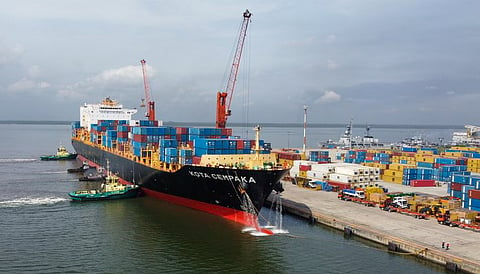
- NEWS
- the EDIT
- COMMENTARY
- BUSINESS
- LIFE
- SHOW
- ACTION
- GLOBAL GOALS
- SNAPS
- DYARYO TIRADA
- MORE

It's a long, long way between the Philippines and Nigeria — no less than 18 flight hours to wit — but the truly kindred nations from two different continents have never been beyond range.
No distance is too far for many mutually beneficial outcomes to flourish: from trade and people-topeople partnerships, education, tourism.
The Philippines and Nigeria have been exceeding the country mile since 1962 in a productive interchange that is now, more than ever, even girding for the next phase.
EDUCATIONAL TOURISM
Aside from a decent level of bilateral trade (that peaked in 2020 at over a million dollars), peoples have traditionally been the most tangible representation of the relationship between the Philippines and Nigeria, which have both thrived in revenues and values brought by steady streams of tourists from both sides.
The bulk of over 10,000 Nigerians residing in the Philippines study in the Philippines' various higher education institutions.
“I was told that the number was even higher in the ’90s. The graduates even have an alum association here in Nigeria,” shared Filipino Ambassador to Nigeria Mersole Mellejor.
NIGERIAN OIL PROMISE
“There is also a good number of Nigerians pursuing productive careers in the Philippines -- perhaps in the medical and the entertainment industry.”
Before the global financial crisis in 2009, the number of Filipinos in Nigeria was reported to have peaked at 8,000.
These were primarily professionals working in various capacities in oil and industrial states, industries located throughout Nigeria, and, most significantly, the services sector.
Today, there are over 3,000 Filipinos working in Nigeria, mainly in the oil sector.
Nigerian President Bola Tinubu is bullish on the African nation's Southeast Asian link as the country recently took a daring step to increase its natural gas production to boost exports and meet domestic demand.
Tinubu said the two countries have already inked agreements to advance trade and economic cooperation.
He invites Filipino investors to look at business prospects in Nigeria.
The democratic country is strategically the largest economy and population in Africa.
LOGISTICS HUB
Eastern Nigeria, aside from being a well-known oil and gas powerhouse, is rapidly developing as a major logistics hub.
With a positive outlook on Nigeria's economic prospects, Filipino-owned and -operated ICTSI intends to increase its investments in port machinery, technology and other infrastructure enhancements to make the terminal's operations and procedures safer, more fluid and more effective.
In 2021, ICTSI opened Onne Multipurpose Terminal at the Port of Onne in Rivers State, which doubles the modern container handling capacity of Eastern Nigeria.
ICTSI is revitalizing the region with large sums of money to invest in OMT.
Thus far, ICTSI has spent $35 million on modern hardware, information technology and staff development.
The second phase will involve significant infrastructural renovations and investments totaling $100 million in larger and new equipment.
MOVING GOODS
Additionally, Nigeria and the Philippines are stepping up their collaboration on value-chain development and food security.
Nigeria had offered to provide the Philippines with less expensive soy beans.
The country had also requested the Philippines' help in acquiring harvest and post-harvest technology, as well as best practices in the production of cashew, onions, cacao and mangoes.
Nigeria is the 53rd trading partner of the Philippines.
According to recent figures, Nigeria received $9,190 worth of Philippine exports and sent out $73,780 worth of imported products to the Philippines.
The Philippines' top exports to Nigeria include stearic and palmitic acid, their salts and esters; driers for agricultural products; and various cosmetic and skin-care items (apart from medications).
The Southeast Asian nation also exports various office equipment, extracts and coffee.
Nigeria’s top imports to the Philippines include other liquified petroleum gases; liquified propane; liquified butane and bran.
Materials, accessories and supplies are imported on a consignment basis for the manufacture of electrical and electronic machinery, equipment and parts.
COALITION ANTI-TERRORISM
Nigeria and the Philippines can continuously improve democratic governance and law enforcement in a number of areas.
The Philippines took an active part in this year's high-level African counterterrorism forum held in Nigeria.
The goal of the summit, which was arranged by Nigeria and the UN Office on Counterterrorism, was to strengthen cooperation between foreign allies and terrorism-affected African member-states.
The Philippines supports the UN Joint Appeal for Counter-Terrorism in Africa, seeing it as an essential tool for tackling new and complicated challenges in a collaborative, creative and strategic manner through multi-partner projects.
It reiterated its commitment to strengthening international collaboration in the combating of terrorism in all its complexities.
Additionally, the country stated that it is willing to share its own experiences with African governments and peoples to promote country-led and country-owned solutions
One such example is the enactment of historic national laws that bolster institutional capacities for counterterrorism and prevention.
Furthermore, the Philippines reaffirmed its commitment to a peace and security strategy that is transparent, inclusive, people-centered and grounded on human rights.
The Philippine Development Plan serves as the foundation for this pledge.
The country is requesting Nigeria's support for a non-permanent seat in the UN Security Council in anticipation of the June 2027–2028 elections in New York.
